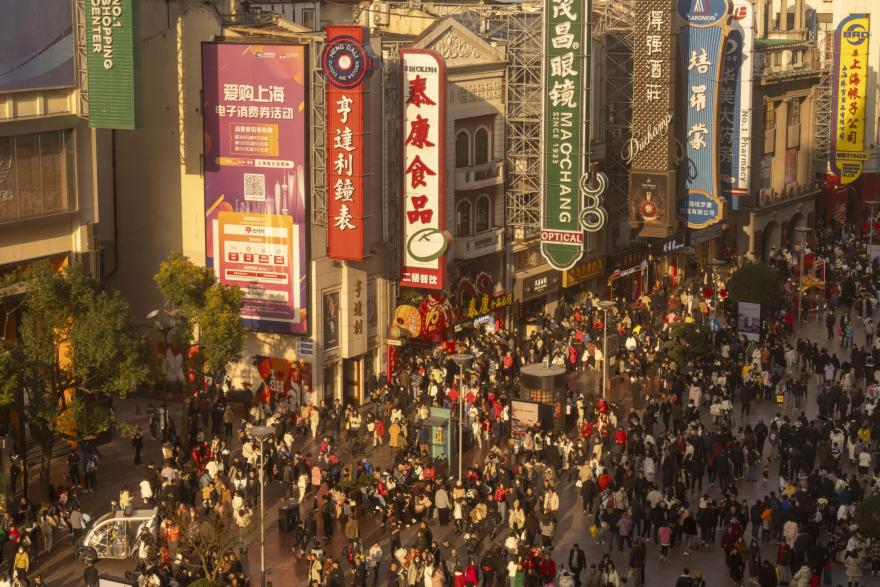[ad_1]
CHINA’S price-conscious shoppers are trading down amid a fragile economic recovery, delivering a boon to firms that cater to the trend while adding pressure on premium brands.
The frugality has brought a bump in earnings and share prices for the likes of fast food chain Yum China Holdings – which operates KFC and Pizza Hut on the mainland – and Uniqlo owner Fast Retailing, whose China expansion has also been received positively. Meanwhile, lacklustre showings by the more pricier brands including Starbucks and L’Oreal in the giant consumer market have weighed on their stock performance.
Chinese consumers – once major buyers of global luxury goods – are tightening their purse strings as a real estate crisis and job insecurity hurt confidence. Consumer prices have fallen for four straight months, intensifying a price war among retailers. Shoppers are demanding more bang for the buck, putting middling brands in a difficult position and making luxury items harder to sell.
“People are not having enough confidence to invest or spend on big-ticket items like purchasing a new home, purchasing a new car, making bigger investments” and this trend will continue, said Terrence Kan, client portfolio strategist at Fidelity Investment Management. “It is a switch in purchasing behaviour within the Chinese people – what’s driving it is confidence,” which hinges on the property market’s recovery, he added.
With China’s economy expected to remain lukewarm for now, global businesses will have to adjust their positioning to grab a bigger slice of the market. The shift has also been evident in homegrown brands. Alibaba Group Holding briefly lost its position as China’s most valuable e-commerce firm to upstart PDD Holdings last year, which is known for its domestic bargains platform Pinduoduo.
Shares of Yum China soared most since 2022 earlier this month after fourth-quarter sales beat estimates, reflecting the fast food chain operator’s successful roll-out of new deals to lure cautious Chinese diners. Earnings showed that same-store sales grew at KFC and Pizza Hut, while traffic surged by the mid-teens from a year ago.
McDonald’s posted the biggest monthly stock gain in a year in November as it announced a plan to buy Carlyle Group’s minority stake in a partnership that runs the chain’s business in China. The company later said it will open about 1,000 restaurants in China this year.
Luxury woes
The thriftiness of Chinese spenders was on full display during the Chinese New Year holiday, when per-capita tourism revenue slumped compared to 2019 even as the number of domestic trips jumped 19 per cent. Meanwhile, falling consumer prices show deflationary pressure is taking hold and undermining companies’ pricing power.
Global brands that have pinned their hopes on a strong revival in China’s spending power have been left in the cold.
L’Oreal’s shares are yet to recover after disappointing sales due to a decline in shopping by Chinese travellers triggered a one-day plunge of more than 7 per cent earlier in February. Nike, which gets about 14 per cent of its revenue from Greater China, remains down more than 13 per cent since the sports apparel maker gave a weak outlook for China in late December.
Japanese cosmetics maker Shiseido is sitting out the country’s historic rally as it struggles with sales in China, which accounts for about a third of revenue. Luckin Coffee – which sells the drink for as little as 9.9 yuan (S$1.85) a cup – became the mainland’s dominant coffee chain last year, outpacing Starbucks in annual sales for the first time.
McDonald’s, Yum China and Fast Retailing have all seen their 12-month forward earnings estimates raised this year whereas the picture is more mixed for premium names. L’Oreal and Shiseido have received downgrades while Starbucks and Nike have seen increases.
While European luxury stocks have performed well recently amid a resurgence of spending by US consumers, there’s a case for caution as Citigroup estimates that about 10 per cent of the cohort’s sales come from China.
“No one’s shopping for an expensive product or the mid-end, they’re spending on the low-end,” said Ronald Chan, chief investment officer at Chartwell Capital. BLOOMBERG
[ad_2]
Source link





